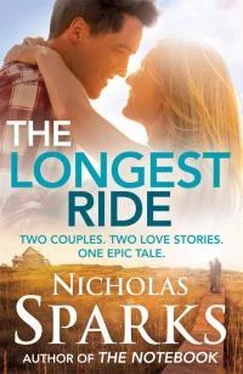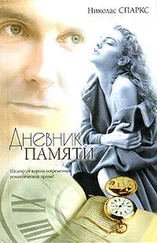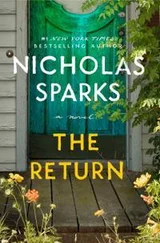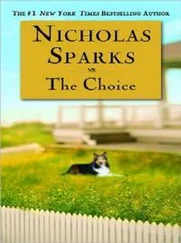If anything, it had grown worse since he’d seen Big Ugly Critter go after Harris. The event promoters should have been aware of the danger, given the bull’s history. They should have had five bullfighters in the ring, not just two. But even after Miller had ridden, they hadn’t learned their lesson. The bull was dangerous. Psychotic, even.
Like the other finalists, Luke lined up for the last draw of the day, and one by one, he heard the bulls being assigned to the various riders. Raptor went third, Locomotive went seventh, and as the names continued, his sense of foreboding intensified. He couldn’t look at the other competitors; instead, he closed his eyes, waiting for the inevitable.
And in the end, just as part of him had known would happen, he drew Big Ugly Critter.
Time slowed down in the final round. The first two riders stayed on, the next three were tossed. It went back and forth on the next two.
Luke sat in his truck, listening to the announcer. His heartbeat began to speed up as adrenaline flooded his system. He tried to convince himself he was ready, that he was up to the challenge, but he wasn’t. He hadn’t been when he’d been at his peak, let alone now.
He didn’t want to go out there. He didn’t want to hear the announcer mention the truck he could win or the fact that the bull hadn’t been ridden successfully in the last three years. He didn’t want the announcer to tell the crowd that Big Ugly Critter was the bull who’d almost killed him, turning his potential ride into some sort of grudge match. Because it wasn’t. He didn’t hold a grudge against the bull. He was just an animal, albeit the craziest, meanest one he’d ever come across.
He wondered whether he should simply withdraw. Take the scores from his first two rides and be done with it. He’d still finish in the top ten, maybe even the top five, depending on how well the other riders did after all was said and done. He might drop in the overall rankings, but he’d remain in position to make the big tour…
Where Big Ugly Critter would surely end up.
But what would happen the next time? If he drew the bull in the first round? When he was in California, for instance? Or Utah? After spending a small fortune on the flight and the motel and food? Would he be prepared to walk away then, too?
He didn’t know. Right now, his mind was incoherent, filled with static, though when he glanced down, his hands were completely still. Odd, he thought, considering…
In the distance, the roar of the crowd went up, signaling a successful ride. A good one from the sound of it. Good for him, Luke thought, whoever it was. These days, he begrudged no one his success. He, more than anyone, knew the risks.
It was time. If he was going to go through with it, he had to make his decision. Stay or go, ride or withdraw, save the ranch or let the bank take it away.
Live or die…
He drew a long breath. Hands still good. He was as ready as he’d ever be. Pushing open the door, he stepped onto the hard-packed dirt and gazed upward at the darkening winter sky.
Live or die. That’s what it all came down to. Steeling himself to the walk to the arena, he wondered which it would be.
28
Ira
When I wake, my first thought is that my body is weak and growing steadily weaker. Sleep, instead of giving me strength, has robbed me of some of the precious hours I have remaining.
Morning sunlight slants through the window, reflected bright and sharp by the snow. It takes a moment to realize that it’s Monday. More than thirty-six hours now since the accident. Who could have imagined such a thing happening to an old man like me? This will to live. But I have always been a survivor, a man who laughs in the face of death and spits in the eye of mother fate. I fear nothing, not even the pain. It’s time for me to open the door and scale the embankment, to flag down a passing car. If no one comes to me, I will have to go to them.
Who am I kidding?
I can do no such thing. The agony is so intense that it takes a concerted effort to bring the world back into focus. For a moment, I feel strangely dissociated from my body – I can see myself propped on the steering wheel, my body a broken wreck. For the first time since the accident, I am sure that it is no longer possible for me to move. The bells are tolling, and I do not have long. This should frighten me, but it doesn’t. In no small way, I have been waiting to die for the last nine years.
I was not meant to be alone. I am not good at it. The years since Ruth’s passing have ticked by with the kind of desperate silence known only to the elderly. It is a silence underscored by loneliness and the knowledge that the good years are already in the past, coupled with the complications of old age itself.
The body is not meant to survive nearly a century. I speak from experience when I say this. Two years after Ruth died, I suffered a minor heart attack – I was barely able to dial for help before I fell to the floor, unconscious. Two years after that, it became difficult to maintain my balance, and I purchased the walker to keep from toppling into the rosebushes whenever I ventured outside.
Caring for my father had taught me to expect these kinds of challenges, and I was largely able to move past them. What I hadn’t expected, however, was the endless array of minor torments – little things, once so easy, now rendered impossible. I can no longer open a jar of jelly; I have the cashier at the supermarket do it before she slips it into the bag. My hands shake so much that my penmanship is barely legible, which makes it difficult to pay the bills. I can read only in the brightest of lights, and without my dentures in place, I can eat nothing but soup. Even at night, age is torturous. It takes forever for me to fall asleep, and prolonged slumber is a mirage. There is medicine, too – so many pills that I’ve had to tack a chart on the refrigerator to keep them straight. Medicine for arthritis and high blood pressure and high cholesterol, some taken with food and some without, and I’m told that I must always carry nitroglycerine pills in my pocket, in the event I ever again feel that searing pain in my chest. Before the cancer took root – a cancer that will gnaw at me until I’m nothing but skin and bones – I used to wonder what indignity the future would bring next. And God, in his wisdom, provided the answer. How about an accident! Let’s break his bones and bury him in snow! I sometimes think God has an odd sense of humor.
Had I said this to Ruth, she would not have laughed. She would say I should be thankful, for not everyone is blessed with a long life. She would have said that the accident was my fault. And then, with a shrug, she would have explained that I had lived because our story was not yet finished.
What became of me? And what will become of the collection?
I’ve spent nine years answering these questions, and I think Ruth would have been pleased. I’ve spent these years surrounded by Ruth’s passion; I have spent my years embraced by her. Everywhere I have looked, I’ve been reminded of her, and before I go to bed every night, I stare at the painting above the fireplace, comforted by the knowledge that our story will have precisely the kind of ending that Ruth would have wanted.
The sun rises higher, and I hurt even in the distant recesses of my body. My throat is parched and all I want is to close my eyes and fade away.
But Ruth will not let me. There is an intensity in her gaze that wills me to look at her.
“It is worse now,” she says. “The way you are feeling.”
“I’m just tired,” I mumble.
“Yes,” she says. “But it is not your time yet. There is more you must tell me.”
I can barely make out her words. “Why?”
Читать дальше











![Николас Спаркс - Каждый вдох [litres]](/books/414723/nikolas-sparks-kazhdyj-vdoh-litres-thumb.webp)
